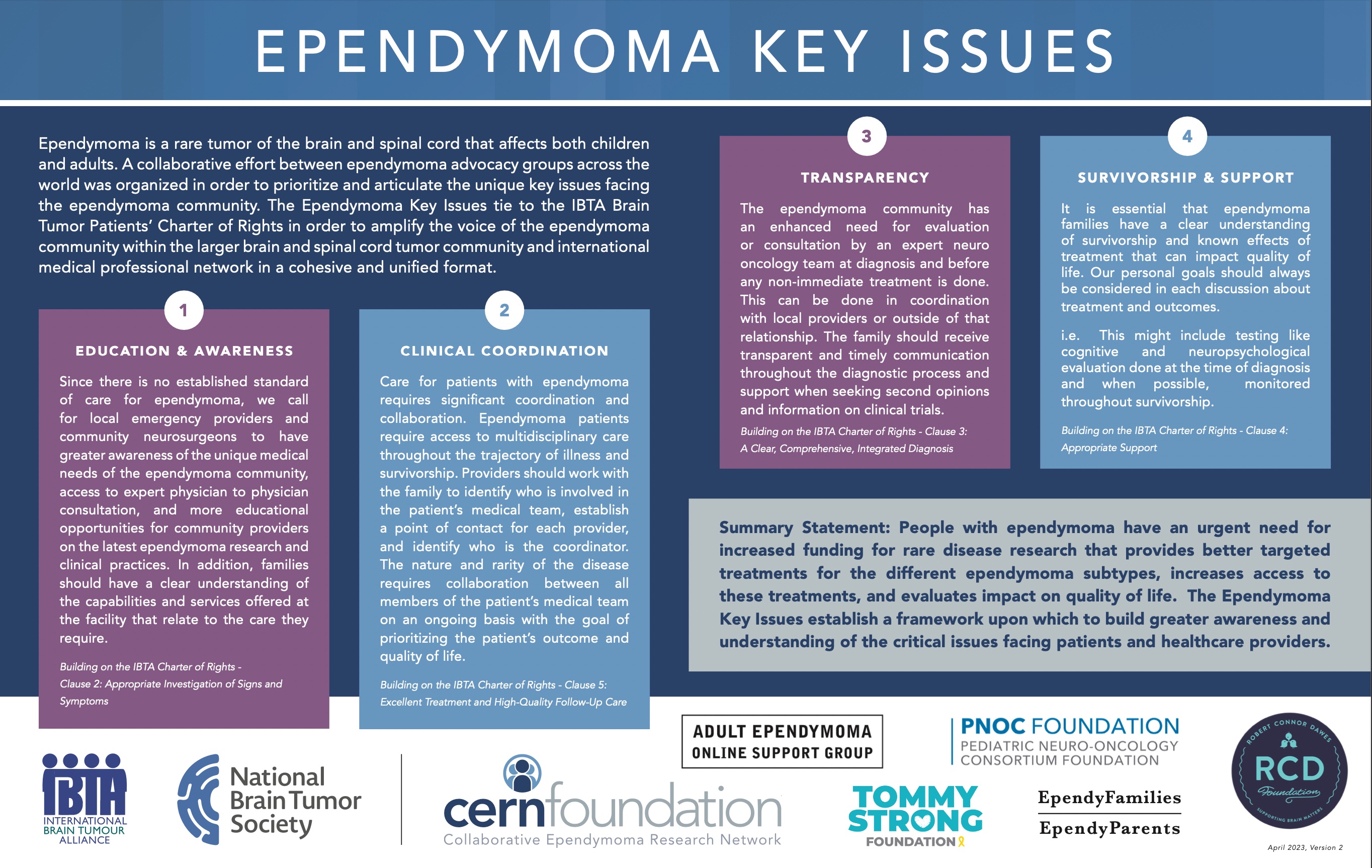Ependymoma Key Issues
— Categories: Press Release Ependymoma Community Posted on June 13, 2023
The Ependymoma Key Issue effort serves as a critical example for other groups that are looking for a launching point to address how their unique challenges and opportunities fit within the larger narrative needs of the global brain tumor community.
Ependymoma is a rare tumor of the brain and spinal cord that affects both children and adults. A collaborative effort between ependymoma advocacy groups across the world was organized in order to prioritize and articulate the unique key issues facing the ependymoma community. The Ependymoma Key Issues tie to the IBTA Brain Tumor Patients' Charter of Rights in order to amplify the voice of the ependymoma community within the larger brain and spinal cord tumor community and international medical professional network in a cohesive and unified format.

 Key Issue 1 – Education and Awareness
Key Issue 1 – Education and Awareness
Since there is no established standard of care for ependymoma, we call for local emergency providers and community neurosurgeons to have greater awareness of the unique medical needs of the ependymoma community, access to expert physician to physician consultation, and more educational opportunities for community providers on the latest ependymoma research and clinical practices. In addition, families should have a clear understanding of the capabilities and services offered at the facility that relate to the care they require.
Building on the IBTA Charter of Rights - Clause 2: Appropriate Investigation of Signs and Symptoms
Key Issue 2 - Clinical Coordination
Care for patients with ependymoma requires significant coordination and collaboration. Ependymoma patients require access to multidisciplinary care throughout the trajectory of illness and survivorship. Providers should work with the family to identify who is involved in the patient’s medical team, establish a point of contact for each provider, and identify who is the coordinator. The nature and rarity of the disease requires collaboration between all members of the patient’s medical team on an ongoing basis with the goal of prioritizing the patient’s outcome and quality of life.
Building on IBTA Charter of Rights - Clause 5: Excellent Treatment and High-Quality Follow-Up Care
Key Issue 3 – Transparency
The ependymoma community has an enhanced need for evaluation or consultation by an expert neuro oncology team at diagnosis and before any non-immediate treatment is done. This can be done in coordination with local providers or outside of that relationship. The family should receive transparent and timely communication throughout the diagnostic process and support when seeking second opinions and information on clinical trials.
Building on IBTA Charter of Rights - Clause 3: A Clear, Comprehensive, Integrated Diagnosis
Key Issue 4 – Survivorship and Support
It is essential that ependymoma families have a clear understanding of survivorship and known effects of treatment that can impact quality of life. Our personal goals should always be considered in each discussion about treatment and outcomes.
i.e. This might include testing like cognitive and neuropsychological evaluation done at the time of diagnosis and when possible, monitored throughout survivorship.
Building on IBTA Charter of Rights - Clause 4: Appropriate Support
Summary Statement:
People with ependymoma have an urgent need for increased funding for rare disease research that provides better targeted treatments for the different ependymoma subtypes, increases access to these treatments, and evaluates impact on quality of life. We hope that the Ependymoma Key Issues establish a framework upon which to build greater awareness and understanding of the critical issues facing patients and healthcare providers.
April 2023, Version 2 - Ependymoma Key Issue 3 - Transparency - updated to include clinical trials
